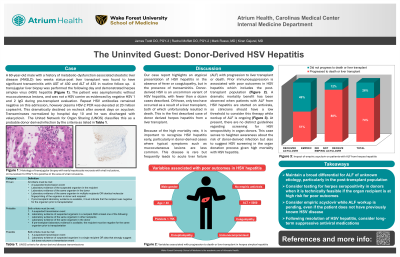Sunday Poster Session
Category: Liver
P1346 - The Uninvited Guest: Donor-Derived HSV Hepatitis
Sunday, October 27, 2024
3:30 PM - 7:00 PM ET
Location: Exhibit Hall E

Has Audio

James Z. Todd, DO
Atrium Health
Charlotte, NC
Presenting Author(s)
James Z. Todd, DO, Rachel Moffett, DO
Atrium Health, Charlotte, NC
Introduction: Herpes simplex virus (HSV) hepatitis is an uncommon but serious condition, with approximately 74% of cases progressing to either death or liver transplantation. It is exceedingly rare for HSV transmission to occur from a solid-organ transplant resulting in HSV hepatitis. We present a unique case of likely donor-derived HSV hepatitis in a confirmed seronegative patient following liver transplantation.
Case Description/Methods: A 60-year-old male with a history of metabolic-dysfunction associated steatotic liver disease two weeks status-post liver transplant was found to have significant transaminitis with AST of 430 and ALT of 435 in routine follow up. A transjugular liver biopsy was performed the following day and demonstrated HSV hepatitis. The patient was asymptomatic without mucocutaneous lesions and was not a HSV carrier as evidenced by negative HSV 1 and 2 IgG during pre-transplant evaluation. Repeat HSV 1 and 2 IgG remained negative on this admission, however plasma HSV-2 PCR was 20 million copies/ml. This dramatically declined on recheck after several days on acyclovir. Transaminases normalized by hospital day 10 and he was discharged with valacyclovir. The donor's HSV serostatus is not known as HSV serology could not be performed on donor’s stored serum. This is likely a donor derived infection as the patient had negative HSV serologies, no sexual contact in greater than 10 years, and no recent blood transfusions.
Discussion: Our case report highlights an atypical presentation of HSV hepatitis in the absence of fever or coagulopathy, but in the presence of transaminitis. It is important to recognize HSV hepatitis early, particularly in donor-derived cases where typical symptoms such as mucocutaneous lesions are less common. This disease is rare but frequently leads to acute liver failure (ALF) with progression to liver transplantation or death. Prior immunosuppression is associated with poor outcomes in HSV hepatitis which includes the post-transplant population. A dramatic mortality benefit has been observed when patients with ALF from HSV hepatitis are started on antivirals, so clinicians should have a low threshold to consider this therapy while workup of ALF is ongoing. At present, there are no distinct guidelines regarding screening for HSV seropositivity in organ donors. This case serves to heighten awareness about the risk of donor-derived infection but also to suggest HSV screening in the organ donation process given high mortality with HSV hepatitis.
Disclosures:
James Z. Todd, DO, Rachel Moffett, DO. P1346 - The Uninvited Guest: Donor-Derived HSV Hepatitis, ACG 2024 Annual Scientific Meeting Abstracts. Philadelphia, PA: American College of Gastroenterology.
Atrium Health, Charlotte, NC
Introduction: Herpes simplex virus (HSV) hepatitis is an uncommon but serious condition, with approximately 74% of cases progressing to either death or liver transplantation. It is exceedingly rare for HSV transmission to occur from a solid-organ transplant resulting in HSV hepatitis. We present a unique case of likely donor-derived HSV hepatitis in a confirmed seronegative patient following liver transplantation.
Case Description/Methods: A 60-year-old male with a history of metabolic-dysfunction associated steatotic liver disease two weeks status-post liver transplant was found to have significant transaminitis with AST of 430 and ALT of 435 in routine follow up. A transjugular liver biopsy was performed the following day and demonstrated HSV hepatitis. The patient was asymptomatic without mucocutaneous lesions and was not a HSV carrier as evidenced by negative HSV 1 and 2 IgG during pre-transplant evaluation. Repeat HSV 1 and 2 IgG remained negative on this admission, however plasma HSV-2 PCR was 20 million copies/ml. This dramatically declined on recheck after several days on acyclovir. Transaminases normalized by hospital day 10 and he was discharged with valacyclovir. The donor's HSV serostatus is not known as HSV serology could not be performed on donor’s stored serum. This is likely a donor derived infection as the patient had negative HSV serologies, no sexual contact in greater than 10 years, and no recent blood transfusions.
Discussion: Our case report highlights an atypical presentation of HSV hepatitis in the absence of fever or coagulopathy, but in the presence of transaminitis. It is important to recognize HSV hepatitis early, particularly in donor-derived cases where typical symptoms such as mucocutaneous lesions are less common. This disease is rare but frequently leads to acute liver failure (ALF) with progression to liver transplantation or death. Prior immunosuppression is associated with poor outcomes in HSV hepatitis which includes the post-transplant population. A dramatic mortality benefit has been observed when patients with ALF from HSV hepatitis are started on antivirals, so clinicians should have a low threshold to consider this therapy while workup of ALF is ongoing. At present, there are no distinct guidelines regarding screening for HSV seropositivity in organ donors. This case serves to heighten awareness about the risk of donor-derived infection but also to suggest HSV screening in the organ donation process given high mortality with HSV hepatitis.
Disclosures:
James Todd indicated no relevant financial relationships.
Rachel Moffett indicated no relevant financial relationships.
James Z. Todd, DO, Rachel Moffett, DO. P1346 - The Uninvited Guest: Donor-Derived HSV Hepatitis, ACG 2024 Annual Scientific Meeting Abstracts. Philadelphia, PA: American College of Gastroenterology.
